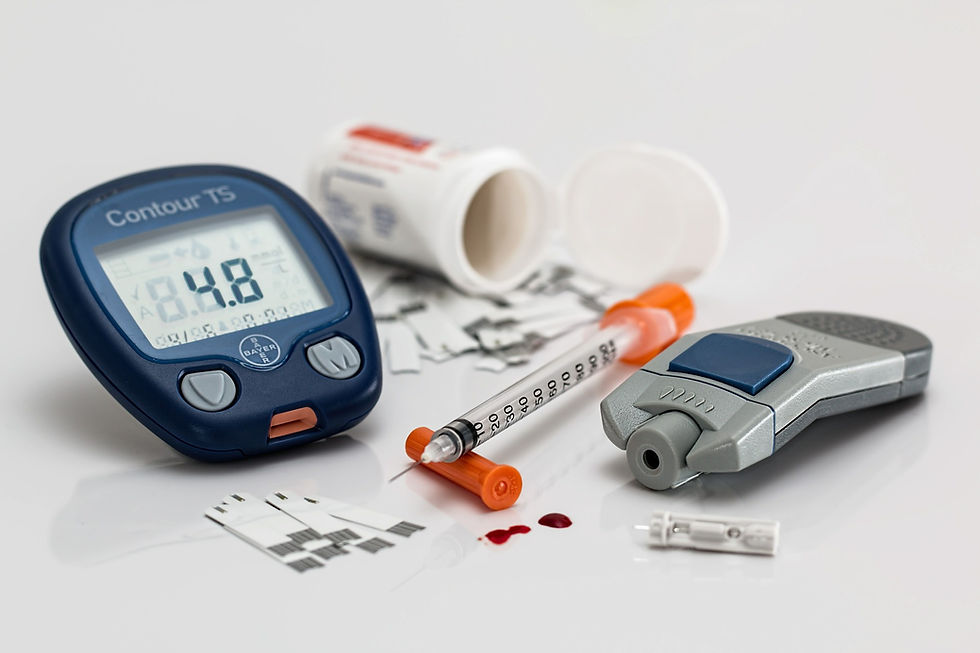
It is estimated that 11.3% of the US population have been diagnosed with diabetes, while another 38% of the population has prediabetes. That's more than 122 million Americans that are living with this health condition. Diabetes is closely related to heart disease and is the primary cause of more than 9 other serious health conditions, including kidney failure, adult blindness, and lower-limb amputations. We want to raise awareness of this disease to help prevent, manage, and cure diabetes and help those who are affected by it.
The CDC defines diabetes as "a chronic health condition that affects how your body turns food into energy...with diabetes, your body either doesn't make enough insulin or can't use it as well as it should."
There are three main types of diabetes: Type 1, Type 2, and gestational diabetes.
Type 1 diabetes is usually diagnosed in younger children, teens, and young adults and it thought to be an autoimmune reaction that stops your body from making insulin.
Type 2 diabetes is the most common. With this type, your body doesn't use insulin as it should and can't keep blood sugar at normal levels. The good news is it can be prevented or managed with healthy lifestyle changes. There is also medication or insulin that can help manage it.
Gestational diabetes occurs in some pregnant women. This form typically goes away after birth, but it can increase the chances of type 2 diabetes later in life.
How do you know if you are at risk for diabetes? Get your blood glucose levels tested. This is the easiest way to see if you are in the prediabetic stage. Your doctor may recommend other blood tests like A1C, FPG, OGTT, etc.
If you have been diagnosed with Type 2 diabetes, don't get overwhelmed. There are ways to manage it with a balanced diet, active lifestyle, and (sometimes) medication. You can still live a long, healthy life with diabetes. There are many resources available to you to help you navigate your way. The American Diabetes Association website (American Diabetes Association | Research, Education, Advocacy) is a great place to start for information, recipes and nutrition guidelines, and support.
The number of adults diagnosed with diabetes has more than doubled in the last 20 years. That's why awareness, getting your blood sugars tested, and living a healthy and active lifestyle are so important. Early diagnosis is important as prediabetes can often be reversed. Take steps today to take care of yourself and live your best life possible!
Nutrition Basics
Starting a new diet can sound overwhelming and restrictive. Thinking of it as a lifestyle change and not a temporary diet helps you stay committed! Also keep in mind that everybody is different and will have different nutrition needs. Talk to your doctor or a registered dietician or nutritionist to figure out what eating plan works best for you. Here are some general tips to healthy eating with diabetes:
Eat a variety of colorful vegetables and fruits, lean meats and plant-based sources of protein, whole grains, healthy fats and healthy carbs.
Fill half your plate with non-starchy vegetables, think leafy greens, broccoli, cauliflower, carrots, celery, mushrooms, green beans, tomatoes, etc.
Fill one quarter of your plate with lean protein foods such as fish, chicken, lean beef, soy products, and cheese.
Fill one quarter of your plate with carbohydrate foods. Grains, starchy vegetables like potatoes, legumes, fruit, yogurt and milk are great choices.
Drink water or low-calorie drinks like unsweetened tea or coffee, sparkling water or club soda, flavored water, diet soda or other diet drinks.

Fitness Basics
Getting regular exercise is an important part of managing diabetes and prediabetes. Exercise is not only good for your health, but it makes you feel better as a whole. Walking is a great form of exercise that has many health benefits and is a good option if you are just starting out with an exercise plan.

Weight Loss
When you start eating healthy and exercising, you may lose a few pounds. You will start feeling better and have more energy. It will also get easier to manage your diabetes. When you set realistic goals for yourself, learn what emotions trigger food desires, and get in touch with your body and appetite, you will find that getting back to these basics will help you start your journey to becoming a healthier you.

Diabetes is a serious disease that is affecting more and more people every year. The good news is that there are ways to manage and prevent it by early detection, healthy lifestyle changes, and having a good support team of family and doctors. To find out more about diabetes in older adults, visit Diabetes in Older People | National Institute on Aging (nih.gov).
Sources:

टिप्पणियां